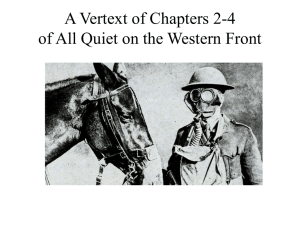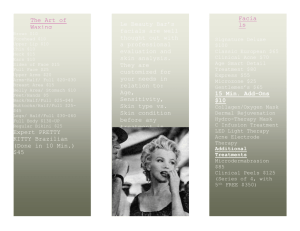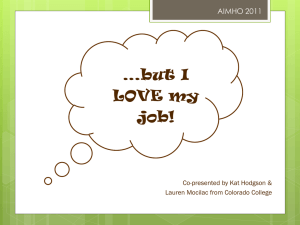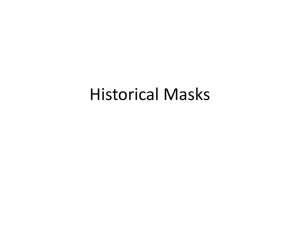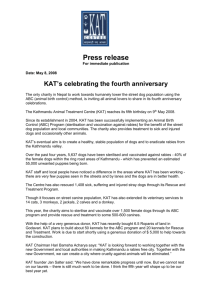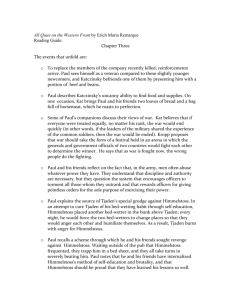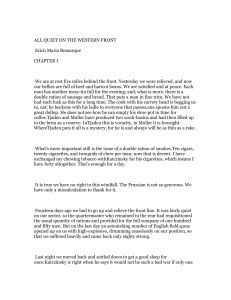WW 1 Trench Warfare Writer All Quiet on the Western
advertisement
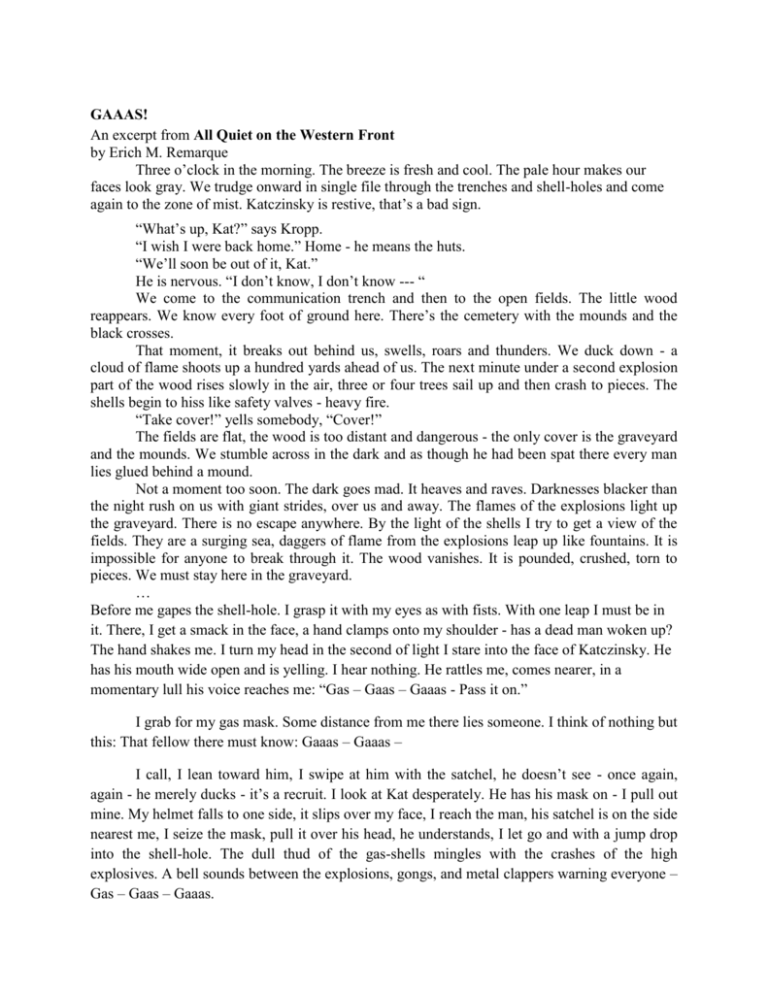
GAAAS! An excerpt from All Quiet on the Western Front by Erich M. Remarque Three o’clock in the morning. The breeze is fresh and cool. The pale hour makes our faces look gray. We trudge onward in single file through the trenches and shell-holes and come again to the zone of mist. Katczinsky is restive, that’s a bad sign. “What’s up, Kat?” says Kropp. “I wish I were back home.” Home - he means the huts. “We’ll soon be out of it, Kat.” He is nervous. “I don’t know, I don’t know --- “ We come to the communication trench and then to the open fields. The little wood reappears. We know every foot of ground here. There’s the cemetery with the mounds and the black crosses. That moment, it breaks out behind us, swells, roars and thunders. We duck down - a cloud of flame shoots up a hundred yards ahead of us. The next minute under a second explosion part of the wood rises slowly in the air, three or four trees sail up and then crash to pieces. The shells begin to hiss like safety valves - heavy fire. “Take cover!” yells somebody, “Cover!” The fields are flat, the wood is too distant and dangerous - the only cover is the graveyard and the mounds. We stumble across in the dark and as though he had been spat there every man lies glued behind a mound. Not a moment too soon. The dark goes mad. It heaves and raves. Darknesses blacker than the night rush on us with giant strides, over us and away. The flames of the explosions light up the graveyard. There is no escape anywhere. By the light of the shells I try to get a view of the fields. They are a surging sea, daggers of flame from the explosions leap up like fountains. It is impossible for anyone to break through it. The wood vanishes. It is pounded, crushed, torn to pieces. We must stay here in the graveyard. … Before me gapes the shell-hole. I grasp it with my eyes as with fists. With one leap I must be in it. There, I get a smack in the face, a hand clamps onto my shoulder - has a dead man woken up? The hand shakes me. I turn my head in the second of light I stare into the face of Katczinsky. He has his mouth wide open and is yelling. I hear nothing. He rattles me, comes nearer, in a momentary lull his voice reaches me: “Gas – Gaas – Gaaas - Pass it on.” I grab for my gas mask. Some distance from me there lies someone. I think of nothing but this: That fellow there must know: Gaaas – Gaaas – I call, I lean toward him, I swipe at him with the satchel, he doesn’t see - once again, again - he merely ducks - it’s a recruit. I look at Kat desperately. He has his mask on - I pull out mine. My helmet falls to one side, it slips over my face, I reach the man, his satchel is on the side nearest me, I seize the mask, pull it over his head, he understands, I let go and with a jump drop into the shell-hole. The dull thud of the gas-shells mingles with the crashes of the high explosives. A bell sounds between the explosions, gongs, and metal clappers warning everyone – Gas – Gaas – Gaaas. Someone plumps down behind me. I wipe the goggles of my mask clear of the moist breath. It is Kat, Kropp and someone else. All four of us lie there in heavy, watchful suspense and breathe as lightly as possible. These first minutes with the mask decide between life and death: is it air-tight? I remember the awful sights in the hospital: the gas patients who in day-long suffocation cough up their burnt lungs in clots. Cautiously, the mouth applied to the valve, I breathe. The gas still creeps over the ground and sinks into all hollows. Like a big, soft jellyfish it floats into our shell-hole and lolls there obscenely. I nudge Kat. It is better to crawl out and lie on top than to stay where the gas collects most. But we don’t get as far as that; a second bombardment begins. It is no longer as though shells roared; it is the earth itself raging. With a crash something black bears down on us. It lands close beside us; a coffin thrown up. I see Kat move and I crawl across. The coffin has hit the fourth man in our hole on his out-stretched arm. He tries to tear off his gas-mask with the other hand. Kropp seizes him just in time, twists the hand sharply behind his back and holds it fast. Kat and I proceed to free the wounded arm. The coffin lid is loose and bursts open, we are easily able to pull it off, we toss the corpse out, it slides down to the bottom of the shell-hole, then we try to loosen the under-part. Fortunately the man swoons and Kropp is able to help us. We no longer have to be careful, but work away till the coffin gives with a sigh before the spade that we have dug in under it. It has grown lighter. Kat takes a piece of the lid, places it under the shattered arm, and we wrap all our bandages round it. For the moment we can do no more. Inside the gas-mask my head booms and roars - it is nigh bursting. My lungs are tight, they breathe always the same hot, used-up air. The veins on my temples are swollen. I feel I am suffocating. A grey light filters through to us. I climb out over the edge of the shell-hole. In the dirty twilight lies a leg torn clean off; the boot is quite whole, I take that all in at a glance. Now something stands up a few yards distant. I polish the windows, in my excitement they are immediately dimmed again. I peer through them. The man there no longer wears his mask. I wait some seconds – he has not collapsed – he looks around and makes a few paces – rattling in my throat I tear my mask off too and fall down, the air streams into me like cold water, my eyes are bursting, the wave sweeps over me and extinguishes me. The shelling has ceased. I drag myself to the crater and tell the others. They take off their masks. We lift up the wounded man, one taking his splintered arm. And so we stumble off hastily. Source: Remarque, Erich Maria, All Quiet on the Western Front, Toronto: McClelland & Stewart, 1929. Questions 1) What compels the author and his colleagues to “stay here in the graveyard”? 2) What prompts the “fourth man in the hole” to tear off his gas mask? 3) How does the author describe the experience of wearing a gas mask? 4) In what way is the author’s description of the battle similar to that of recounting a nightmare? ©
